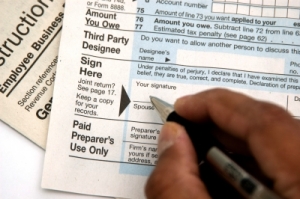by Shige Oishi, University of Virginia

Image courtesy of Arvind Balaraman / FreeDigitalPhotos.net
What is a good society? What is an ideal society? Every four years, the presidential election makes Americans think of this philosophical question. In the end, the choice of president reflects which America is the ideal America: the (pseudo-) meritocratic, winner-take-all, ?strong? America or the egalitarian, ?compassionate? America.
One of the central debates to this end is concerned with taxation: who should pay and how much? President Obama thinks that the rich should pay more, whereas Governor Romney does not. Beyond the rhetoric of ?tax relief? versus ?tax cut?, there is one fundamental aspect missing from the debate on taxation: namely, what is the purpose of taxation to begin with?
Of course, the main purpose of taxation is to pay for public and common goods. In a modern society, residents expect to have access to clean water and air, reliable roads, primary education, parks and green space, personal safety, and services such as garbage pick-up, sewage disposal, and recycling. The government, both local and federal, is responsible for the basic infrastructure, so that its citizens can live healthy lives.
Even a libertarian might agree that people?s quality of life would suffer if residents do not have reliable police, clean water, safe roads, good schools, or garbage pick-up and recycling, and that public and common goods are necessary. Ultimately, then, the optimal taxation system is the system that allows the society to function well, while minimizing the burden (tax) to its citizens.
One way we can decide what the taxation system is optimal is to measure the quality of public and common goods across various societies with different taxation systems, and identify the tax system that maximizes the quality of public and common goods. Where do you see the best public transportation, public education, public space, and social welfare?
Another way to address the issue of the best taxation policy is to see which citizens are the happiest. If the taxation is to provide good public and common goods to citizens, and if providing good public and common goods is important to the quality of citizens? lives, then we might as well measure citizen?s perceived quality of life directly, and identify the taxation system in which citizens are the most satisfied with their lives in general.
Uli Schimmack (U of Toronto), Ed Diener (U of Illinois), and I took the latter approach, and examined whether a certain taxation policy was associated with the happiness of the nations. Considering the main political debate has been between progressive taxation (the rich pays the higher rate of tax) and flat taxation (everyone pays the same rate of tax), we examined the relation between the degree of progressive taxation and the average happiness of citizens across 54 nations (see Oishi, Schimmack, & Diener, 2012, Psychological Science for details).
The bottom line: The residents of the nations with more progressive taxation were happier than those of the nations with less progressive taxation. The correlation coefficient was non-trivial: r = .33 with general life satisfaction and r = .46 with daily positive experiences (e.g., enjoying, smiling, doing something interesting, feeling well-rested).
The nations with the most progressive taxation among the 54 nations were Sweden (the top income bracket?s tax rate is 57%, whereas the lowest income bracket?s tax rate is 0%, i.e., a 57% difference), the Netherlands (52% difference), and Japan (45% difference).? The U.S. ranked #34 among 54 nations with 20% difference (the top income bracket rate is 35%, the lowest is 15%). The nations with the least progressive taxation were Bulgaria, Czech Republic, Estonia and other countries that have flat tax rates. The first observation is that rich Americans do not pay as much as rich Swedish, Dutch, or Japanese people in absolute terms as well as relative terms (relative to non-rich). So, the argument that rich Americans are already paying too much seems inaccurate ?at least from a global perspective.
Some might worry that the ?official? tax rate is different from the ?actual? tax rate (the tax that residents actually pay after various deductions). We checked, therefore, the ?effective? tax rate (published by OECD, which is close to the ?actual? tax rate). The results were virtually the same (r = .36 with general life satisfaction, r = .46 with daily positive experiences).
Of course, the above correlations are, well, simple correlations. Thus, third variables could account for this association. To our surprise, however, progressive taxation was not associated with GDP per capita (r = .15) or income inequality, Gini coefficient (r = .13). Statistically controlling for these variables did not reduce the original correlations.
More interestingly, the degree of progressive taxation was associated with higher levels of satisfaction with public and common goods (r = .54, p < .01). Finally, we showed that the association between progressive taxation and the subjective well-being of the nations was mediated (explained) by citizens? satisfaction with public and common goods. That is, the citizens of the nations with progressive taxation were more satisfied with public and common goods such as transportation, education, and clean water, and also satisfied with their lives in general and reported smiling, enjoying life, being well-rested, and doing something interesting on a daily basis.
Some readers might also wonder if our findings mean that the bigger the government, the better (another important political issue in the U.S.). We checked whether larger government (higher % of GDP spent on the government) was also associated with greater satisfaction with public and common goods and greater life satisfaction and well-being in general. To our surprise, that was NOT the case. The government spending as a percentage of GDP was NEGATIVELY associated with general life satisfaction (r = -.46) and daily positive experiences (r = -.45): the greater the government spending as a percentage of GDP, the LOWER citizens? life satisfaction and positive daily experiences were (FYI, the U.S. is relatively a ?small? government at this point, ranked #49 out of 73 nations in government spending per GDP).
So, the second observation from our analyses was that it is not the amount of government spending per se, but the progressive taxation that is associated with higher levels of well-being. I suspect that the greater spending is not always translated into better public or common goods, in part because some governments spend a lot of? money on public and common goods, but due to various factors (labor cost, pension, bribes, who knows?), that type of spending does not result in better roads, better transportation, better police, better housing or better education. For some reason, the nations with progressive taxation are doing better in the public and common goods department (the ?why? is an important future research question).
Going back to the presidential debate on taxation, I wish President Obama and Governor Romney debated about the tax policy in the context of citizens? happiness. There are relevant scientific data and findings here. When our paper was published in Psychological Science this January, a Japanese journalist from NHK (Japanese version of BBC) called and asked me ?Has your paper changed the discussion of the tax policy in Congress?? I must admit that was the most astonishing question that I have ever received from a journalist. I just laughed and said ?No way!? I bet no one on Capitol Hill has ever heard about our paper on taxation and happiness. I have never heard any politicians talk about our paper, let alone newspapers or news magazines seriously talking about our findings in the context of the presidential debate. ?I wish our paper had such an impact on real politics! Maybe someday?
Author Information
 Dr. Shige Oishi? is a professor in psychology at the University of Virginia. His research centers on culture, social ecology, personality, and well-being. His primary research goals are (a) to uncover the causes and consequences of subjective well-being, and (b) to delineate how social ecology and human psyche make each other up. Specific research topics include residential mobility, life satisfaction, feeling understood and misunderstood, relationship satisfaction, self-concepts, pro-community behaviors, goals and values, and emotion.? He is a regular contributor to Personality and Social Psychology Connections (click here to read his previous posts).
Dr. Shige Oishi? is a professor in psychology at the University of Virginia. His research centers on culture, social ecology, personality, and well-being. His primary research goals are (a) to uncover the causes and consequences of subjective well-being, and (b) to delineate how social ecology and human psyche make each other up. Specific research topics include residential mobility, life satisfaction, feeling understood and misunderstood, relationship satisfaction, self-concepts, pro-community behaviors, goals and values, and emotion.? He is a regular contributor to Personality and Social Psychology Connections (click here to read his previous posts).
Reference
Oishi, S., Schimmack, U., & Diener, E. (2012). Progressive taxation and the subjective well-being of nations.?Psychological Science, 23, 86-92.
Acknowledgements
I thank Jordan Axt, Matt Motyl, Minha Lee, Thomas Talhelm, Yishan Xu, and Casey Eggleston for their comments.
Image Credit:
Image (ID: 10013658) courtesy of Arvind Balaraman / FreeDigitalPhotos.net
Source: http://spsptalks.wordpress.com/2012/10/25/what-is-a-good-society-taxation-and-happiness/
green eggs and ham wiz khalifa and amber rose oh the places you ll go blunt amendment justin bieber birthday read across america vikings stadium
No comments:
Post a Comment
Note: Only a member of this blog may post a comment.